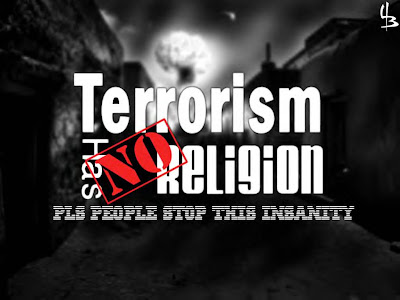A couple of days ago one of my readers passed on this video to me and it got me thinking about the stereotyping of Muslims...being Native American myself I know all too well the game of stereotyping...Anyway here is her letter and my research follows...
Hello Ajarn Mike,
In memory of the tenth anniversary of 9/11, I would like to offer you and your readers of Kultūra a message of peace in a short video and a pledge of tolerance.
http://myfellowamerican.us
Here are some interesting statistics from the European Policing Organization...Europol
They say...
"Terrorism continues to have an impact on the lives of EU citizens -
in 2010, seven people died in the EU as a result of terrorist
attacks. Islamist terrorists carried out three attacks on EU territory.
Separatist groups, on the other hand, were responsible
for 160 attacks, while left-wing and anarchist groups
were responsible for 45 attacks."
On p.7, the 2009 Europol report concludes:
Islamist terrorism is still perceived as being the biggest threat worldwide, despite the fact that the EU only faced one Islamist terrorist attack in 2008. This bomb attack took place in the UK…Separatist terrorism remains the terrorism area which affects the EU most. This includes Basque separatist terrorism in Spain and France, and Corsican terrorism in FranceMore reports from previous years also tell the same story...
https://www.europol.europa.eu/latest_publications/2
The influential think tank the Rand Corporation has also commented on the imaginary threat of Muslim terrorism...
"The scale of the September 11, 2001, attacks tended to obliterate America’s memory of pre-9/11 terrorism, yet measured by the number of terrorist attacks, the volume of domestic terrorist activity was much greater in the 1970s. That tumultuous decade saw 60 to 70 terrorist incidents, mostly bombings, on U.S. soil every year—a level of terrorist activity 15 to 20 times that seen in the years since 9/11, even when foiled plots are counted as incidents. And in the nine-year period from 1970 to 1978, 72 people died in terrorist incidents, more than five times the number killed by jihadist terrorists in the United States in the almost nine years since 9/11."
The contrast between the level of terrorist violence in the United States today and that in the 1970s is indicated in RAND’s chronology of terrorism, which records 83 terrorist attacks in the United States between 9/11 and the end of 2009, only three of which were clearly connected with the jihadist cause. (The RAND database includes Abdulmutallab’s failed Christmas Day attempt to detonate a bomb on an airplane.) The other jihadist plots were interrupted by authorities. In addition to the jihadist attacks, this total includes the anthrax letters sent in late 2001, which killed five people, as well as numerous low-level attacks by environmental extremists (38) and animal-rights fanatics (12), which account for most of the violence. In all, 24 people were killed between 9/11 and the end of 2009, including the 13 who died at Fort Hood.
And...
The number of [Jihadist] recruits is still tiny. There are more than 3 million Muslims in the United States, and few more than 100 have joined jihad—about one out of every 30,000—suggesting an American Muslim population that remains hostile to jihadist ideology and its exhortations to violence. A mistrust of American Muslims by other Americans seems misplaced…
In a poll conducted by the Pew Research Center in 2006, 68 percent of American Muslims expressed an unfavorable opinion of al Qaeda. That does not mean that the remaining 32 percent held a favorable view, as 27 percent declined to offer any opinion. Only 5 percent expressed a positive view of al Qaeda, and this was at the height of the war in Iraq, which clearly provoked negative attitudes toward U.S. foreign policy. Seventy-four percent of younger Muslims, those under the age of 30, expressed unfavorable views of al Qaeda, although at the same time, 7 percent expressed favorable views of the organization (Pew Research Center, 2007).
These figures indicate that individuals turning toward violence would find little support in the Muslim community. They are not Mao’s guerrillas swimming in a friendly sea. Even assuming wider antipathy among U.S. Muslims toward certain U.S. policies in the Middle East or in the war on terrorism, the jihadists’ propaganda machine is returning a very low yield of recruits.
You can read the full PDF report here...
http://www.rand.org/pubs/occasional_papers/2010/RAND_OP292.pdf
Another blogger also wrote this inspiring piece on the issue...
Excerpt:
The day after 9/11, my nephew told me how he and his friends beat up a Muslim kid at his school. He didn’t understand why I was so angry at him. “He’s just a Muslim and they hit the twin towers,” was his response. Already, in his mind, it was acceptable to beat up someone because of a general affiliation with a particular group of people. Since that time, at least in America, society has accepted as normal the stereotyping of an entire race or religion based on the actions of a single individual.
We have so bought into this myth that, almost immediately, Muslim groups around the country have condemned Major Hasan’s actions and done everything short of apologizing for being Muslim. Why is this even necessary? Where were the Christian apologists when Tim McVeigh blew up the Murrah building in Oklahoma City? Why is it not necessary for Christians to apologize when abortion clinics get blown up and abortion doctors are murdered? When has any religion stood up to say that they abhor someone’s actions when they beat up and/or kill a homosexual?
Today, there was another shooting, this time in Orlando, Florida. I have yet to hear from any Hispanic groups apologizing for or condemning Mr. Rodriguez’ behavior. You won’t. We simply say that person was a nut, crazy, or a troubled person. In such cases, we are able to separate the troubled person from the group. Not so, it seems, with any Muslim.
No group of people should ever have to apologize for the actions of a single person. That person alone is responsible for their actions. By allowing an entire group to be collectively guilty, you are, in fact, saying that no one in that group is capable of acting respectfully towards other human beings.
As an American, I’ve grown up hearing that we’re supposed to hate all commies and the Russians. Then it was Hispanics. Then, just Mexicans because someone decided that all other people of Hispanic origin were suddenly okay. We were supposed to hate the French and eat Freedom Fries, but that was just stupid. French fries are good. So is French wine. And, so are the French. Now, we’ve moved on to hating Muslims. All this hate is a result of the actions of a few. It does not, and never has, reflected the entire group.
On the way home from work, I was listening to...
Read more here:
http://dailycensored.com/2009/11/06/the-tragedy-of-stereotypes-in-america/
Finally, a study conducted by Duke University and the University of North Carolina concluded...
"Muslim-American communities have been active in preventing radicalization," said Charles Kurzman, professor of sociology at UNC, in the statement. "This is one reason that Muslim-American terrorism has resulted in fewer than three dozen of the 136,000 murders committed in the United States since 9/11."
However, "since 9/11 there has been increased tension among Muslim-Americans about their acceptance in mainstream American society," the study said. Muslim-Americans report feeling a stronger anti-Muslim bias from the media as well as from day-to-day interactions.
"While Muslim-Americans understand and support the need for enhanced security and counterterrorism initiatives, they believe that some of these efforts are discriminatory, and they are angered that innocent Muslim-Americans bear the brunt of the impact of these policies."
Read more here...
http://edition.cnn.com/2010/US/01/06/muslim.radicalization.study/




































